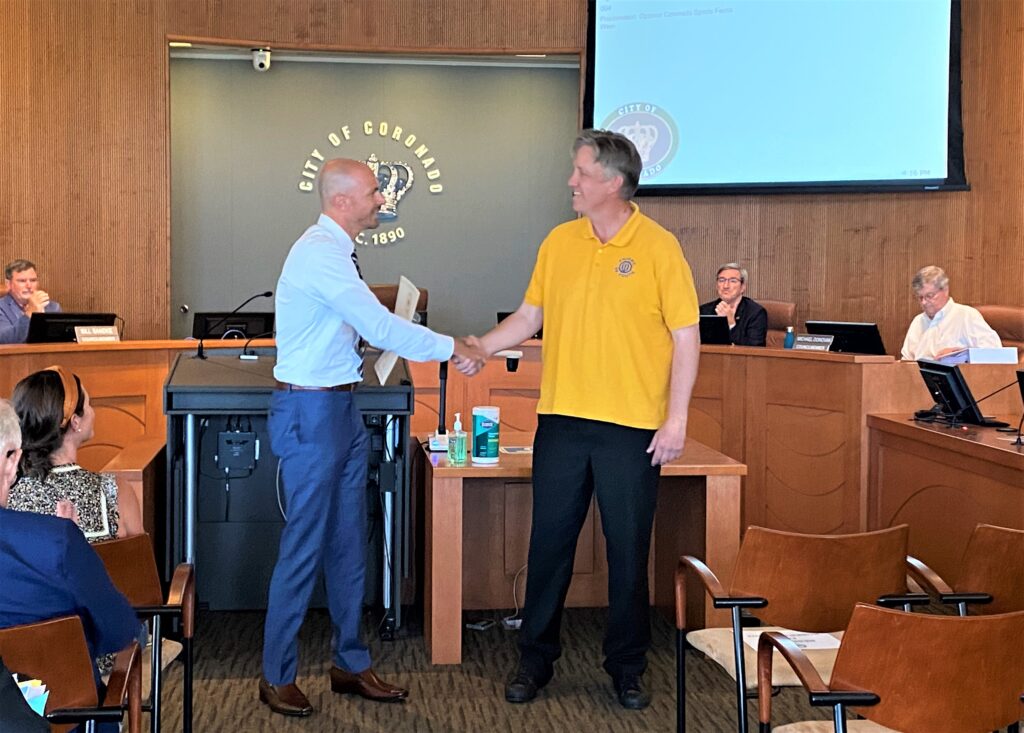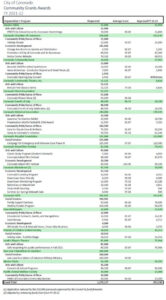
Community Grants and Housing Element options were among the critical topics discussed at the June 15, 2021 city council meeting, which started with Mayor Bailey presenting Optimist Club of Coronado President Robert Kracht with a proclamation proclaiming July 19 through 24 as Optimist Coronado Sports Fiesta Week. The Optimist Club is dedicated to supporting the youth of Coronado by helping a variety of community groups, supporting events, and providing scholarships. They are sponsoring the 50th annual Sports Fiesta on July 24, which is nationally recognized as the longest, continuous running triathlon in the world and features a 5K run, one mile swim, triathlon, and other sporting events. For more information, visit optimistclubofcoronado.org/sports-fiesta/.
Assistant City Manager Dominique Albrecht gave an overview of the FY 2021-2022 Community Grants awarded to 17 organizations, with 35 program applications, who had requested a total of $1,270,137. $950,500 in funds was approved, which is 1.60 percent of general fund revenue – allocation is 1.6% or $1 million, whichever is less.
To see the full list of organizations, requested funds, and amounts approved, open the PDF here.

Organizations provide services in four categories: economic development, social services, arts and culture, and community pride/sense of place, with the majority of the available money of $950,500 going to social services and community pride. Albrecht detailed the process taken to determine the amount of funds allocated to each organization. First, they adjusted for remaining funds not used last year due to the pandemic; step two applied an average score as a percentage of requested funding; step three was to adopt a minimum score threshold of 70 percent, and step four was to fully fund the two core civic events: the Fourth of July and Holiday Parade, for a total of $946,813. This left a difference of $3,686.93 of unspent funds for council’s discretion.
Twelve of the community organizations had representatives speak on the importance their group brings to the community. Councilmember Tanaka felt that $2,240 of unused funds should go to the Coronado Community Band for their portable acoustic shell, which can be used at the high school and other venues in town with all the councilmembers agreeing. Councilmember Heinze asked staff to look at the FOCUS special event budget to determine if the correct costs were projected. Councilmember Donovan promoted giving additional funds to Lamb’s Players Theater, and the council unanimously agreed to give the additional $1,286.93, along with any additional funds from FOCUS, if warranted. The council gave kudos to Albrecht and Senior Management Analyst Kelly Purvis for their outstanding work on this project.
Three options for the Housing Element Update (HEU) were presented by Community Development Director Rich Grunow, who pointed out that none were good options, but this is mandated by the state in an effort to meet the 912 designated Regional Housing Needs Assessment (RHNA) numbers. This update is required every eight years per state law, unless the HEU isn’t certified, and then it drops to a four year cycle. The first option was to proceed with a plan to accommodate the unrealistic RHNA numbers. This option has created public controversy, will be costly, is inconsistent with the city’s litigation position, and has a high probability of not being certified by the California Department of Housing (HCD). Option two, which was the staff recommendation, proposed a revised HEU with 200 additional housing units, which is more feasible and consistent with the city’s SANDAG appeal. With this option, it is highly unlikely the HCD will certify and will likely impose sanctions such as loss of grant funding, litigation, and suspend the city’s authority to issue permits. Option three would be to suspend the HEU, thus allowing the city’s litigation to move forward and spare the city planning resources and expenses. This option comes with many potential consequences including the HEU not being certified, a four-year cycle imposed, loss of grant funding, costly litigation fees, and suspension of the city’s authority to issue permits. The mayor wanted the public to know that this was not a city initiated initiative but felt option two was the most palatable, but all the options had downsides. Councilmember Sandke expressed that this will be a “rough road going forward.” Bottom line is that everyone felt that unreasonable RHNA numbers were dictated by an unfair process and are a waste of public resources that won’t accomplish the goal. Option two was unanimously approved as the most attainable and will be adopted on July 20, 2021.
Interim City Manager Mark Ochenduszko gave an update on the Parker Pump Station Replacement Project and new community park when Councilmember Donovan asked for it to be pulled from the Consent Calendar. The council unanimously approved the purchase of the property at 800 Coronado Avenue for $2,350,000 plus closing costs to support a much needed updated design and site alignment of the Parker Pump Station. A community park space will also be located on the property. “This is a win-win all the way around,” said Ochenduszko, because the land will provide a much needed sewer infrastructure upgrade and park space for the city.
Continuing on to the City Manager’s Report, Ochenduszko highlighted the new COVID reopening phase that just became effective. The new county rules state that masks are not required for fully vaccinated people with the exception of healthcare facilities, public transportation, and schools. Businesses can choose to enforce rules at their own discretion. Cal/OSHA’s rules aren’t currently consistent with the CDC rules and still promote that all employees must wear masks. They will be voting on new guidelines later this week. He noted that the city will be posting signs with the new rules around town for the 4th of July festivities. Recreation activities, including summer camps, get into full swing this week and the Spreckels Center is reopening and will begin classes in phases starting June 21.
He also commented that the Coronado vaccine site has given more than 50,000 free vaccines, with the help of 470 volunteers putting in 200 hours. Due to the severe reduction in activity, the Community Center site is now closed, and free vaccines will now be available at the Sharp Hospital Pharmacy, Monday through Fridays from 9 am to 5 pm.
Ochenduszko also reported that the city’s Comprehensive Annual Financial Report (CAFR) has received the highest award from the Government Finance Officers Association (GFOA). Credit was given to “rock star” Finance Manager Emad Gewaily by Ochenduszko.
Director of Public Services and Engineering Cliff Maurer gave a presentation on the rate adjustments for solid waste and recycling services. With rates adjusted bi-annually, Edco will increase rates 17 percent for single family residents, due in part to the high cost of organics recycling. Councilmember Sandke expressed that some residents had commented that Coronado’s rates were much higher than other cities but discovered that rates here are charged on a two-month cycle, actually making Coronado’s rates some of the most competitive in the region. The increase brings the single family rate to $25.12 bi-monthly. Historically, the city has subsidized homeowners’ rates at 25 percent, but will decrease that to 20 percent this year, and will continue to decrease subsidies in the coming years. The council unanimously approved this Proposition 218 Protest Hearing.
Associate Planner Tricia Olsen gave an overview regarding the appeal of the Historic Resource Commission (HRC) decision to not designate the property at 817 A Avenue as historic. The unanimous HRC decision cited that the home did not meet any of the historic designation criteria, pointing out that many alterations had been made through the years. The appellants spoke and outlined that they were working to restore the Tudor revival historic elements and felt that several of the home’s previous residents qualified it for designation. Mayor Bailey said, “We want to have as many houses designated historic as possible,” but he noted that they must meet the established criteria. Councilmembers Heinze and Donovan felt that it was a stretch to get to one criterion, let alone the two required for designation. Councilmember Tanaka said he felt that it still looked historic, apart from the windows, and he was happy to support historic designation. Councilmember Sandke asked Councilmember Donovan to weigh in, since he helped establish the current historic guidelines, and he said that a consistent interpretation of the Secretary of the Interior’s Standards was vital for equality but suggested that the applicants could make needed changes and apply again. Ultimately, the council voted to uphold the decision of the HRC and deny the appeal, with Councilmember Tanaka voting against this.
A motion was approved to have City Attorney Johanna Canlas research and return with state compliance information on updating the Coronado Municipal Code regarding appointments and special elections to fill city council vacancies. This issue was brought up by Mayor Bailey and Councilmember Sandke, who plans on applying for appointment to be Coronado’s representative as Port Commissioner. If Sandke’s bid is successful, he will have to resign his council seat, leaving a year on his term. Councilmember Sandke made it clear that he wants what’s best for the council and was “not trying to take away the right to have a special election” and he was hurt by the comments on social media that suggested otherwise.
The council also unanimously approved Councilmember Tanaka’s request to ask staff to review the current two-step process required to bring items to council.
Consent Calendar highlights included: Coronado Promenade Concerts received permission to add an additional concert in Spreckels Park on September 12.
Staff was authorized to submit a Defense Community Infrastructure Program (DCIP) grant application for undergrounding utilities along the Silver Strand before the July 12 deadline. The project to underground the utility lines between Fiddler’s Cove and Loews Coronado Bay Resort is currently in the design phase, with an anticipated cost of $9 million. The DCIP’s $60 million discretionary fund ranks grants under three criteria including the enhancement of military value, military resilience, and military life.
The meeting concluded with birthday salutations for Councilmember Tanaka and condolences to Councilmember Sandke on the recent loss of his sister Laura.




